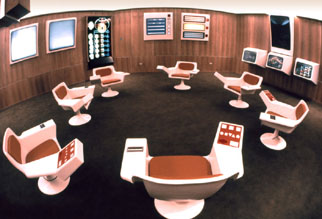In New York for my last f2f meeting of the MLA Committee on Information Technology I got a New York Times with an intriguing article about a Chilean management system, Cybersyn, titled Before the Coup, Chile Tried to Find the Right Software for Socialism.
Cybersyn was born in July 1971 when Fernando Flores, then a 28-year-old government technocrat, sent a letter to Mr. Beer seeking his help in organizing Mr. Allende’s economy by applying cybernetic concepts. Mr. Beer was excited by the prospect of being able to test his ideas.
He wanted to use the telex communications system – a network of teletypewriters – to gather data from factories on variables like daily output, energy use and labor “in real time,” and then use a computer to filter out the important pieces of economic information the government needed to make decisions.
Cybersyn was apparently semi-functional before the coup that overthrew Allende’s government and it was used to help manage around the small-business and truckers strike in 1972. I don’t think the Opsroom pictured above was ever fully operational, but visualization screens were important even if at the time they were hand-drawn slides that were projected rather than computer generated visualizations (see http://varnelis.net/blog/kazys/project_cybersyn on the chairs of the Opsroom.) Beer and the Chileans wanted Cybersyn to help them implement an alternative socialist economy that was managed in real time rather than “free” and chaotic or planned in the heavy handed way of most socialist economies of the time.
Rooting around, I found a good article about Cybersyn and the English visionary designer Stafford Beer from 2003 in the Guardian by Andy Beckett, Santiago Dreaming. It turns out that Beer gave the Massey Lectures in 1971 and they have been reprinted by Anansi as Designing Freedom. He also moved part-time to Toronto in the 80s where his last partner, Dr. Allenna Leonard of Metaphorum still resides. He died in 2002.
Another interesting thread is Fernando Flores who was the political lead of Cybersyn and the person that recruited Beer for the project. After the coup, Flores went to the US and got a Ph.D. in Computer Science collaborating with Terry Winograd, and being influenced by Maturana, also Chilean. That’s right – the Flores of Understanding Computers and Cognition. He is now back in Chile as a senator and supports various projects there.
The common thread is that Beer, Flores and Maturana all seem interested in viable systems in different spheres. They were applying cybernetics.
